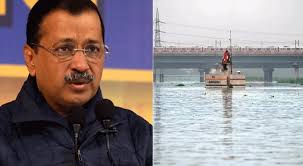Title: Political Tensions Escalate Over Yamuna River Contamination Allegations
Politics Politics of IndiaPosted by NewAdmin on 2025-01-30 08:44:56 |
Share: Facebook | Twitter | Whatsapp | Linkedin Visits: 27

In recent developments, the Yamuna River has become the epicenter of a political confrontation between Delhi Chief Minister Arvind Kejriwal and Prime Minister Narendra Modi. The dispute centers on allegations of water contamination and the ensuing political ramifications.
Arvind Kejriwal has accused the Haryana government of deliberately contaminating the Yamuna River, which supplies water to Delhi. He claims that pollutants have been intentionally introduced into the river, compromising the quality of water reaching the national capital. Kejriwal's assertions have intensified the political discourse, leading to significant reactions from various quarters.
In response, Prime Minister Narendra Modi has criticized Kejriwal's allegations, describing them as baseless and politically motivated. He emphasized the importance of collaborative efforts between states to address environmental challenges and accused Kejriwal of politicizing a critical issue for electoral gains.
The Election Commission has intervened, demanding that Kejriwal provide concrete evidence to substantiate his claims. The commission has set a deadline for the submission of this evidence, underscoring the seriousness of the allegations and their potential impact on public perception.
This confrontation has not only heightened tensions between the Aam Aadmi Party (AAP) and the Bharatiya Janata Party (BJP) but has also drawn attention to the broader issue of river pollution in India. The Yamuna River, a vital water source for millions, has long suffered from pollution due to industrial discharge, sewage, and other contaminants.
Environmental experts have weighed in on the matter, highlighting the need for comprehensive strategies to clean and preserve the Yamuna. They advocate for inter-state cooperation, stringent enforcement of environmental regulations, and increased public awareness to tackle the pollution effectively.
The political spat has also elicited reactions from other political figures. Congress President Mallikarjun Kharge criticized both Modi and Kejriwal, suggesting that they should personally experience the river's condition to grasp the severity of the issue. This remark underscores the frustration among opposition leaders regarding the politicization of environmental concerns.
As the situation unfolds, the focus remains on the authenticity of Kejriwal's claims and the evidence he is expected to present. The outcome of this dispute could have significant implications for inter-state relations, environmental policies, and the political landscape as a whole.
In conclusion, the allegations concerning the Yamuna River's contamination have escalated into a major political controversy. While the veracity of the claims is yet to be determined, the incident has spotlighted the critical issue of river pollution and the necessity for collaborative efforts to ensure the provision of clean water to the populace.
Search
Categories
Recent News
- Bengaluru Metro's Pink Line Expansion: A Breath of Fresh Air for Commuters
- Ghana's Youth Drug Crisis: A National Tragedy
- India's Services Sector Soars: A Boost for the Economy
- Gold Bond Investors Face New Tax Reality
- Bengaluru Colleges Face Uncertain Future: The Looming Fee Hike Crisis
- Anna University Convocation: Minister's Absence Sparks Speculation
- GATE 2026: Countdown to the Crucial Exam
- Sisters' Tragic Fall: A Shocking Wake-Up Call for Ghaziabad